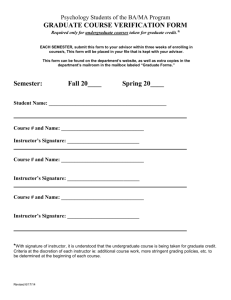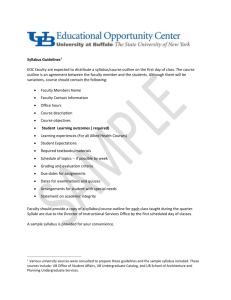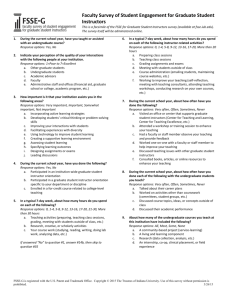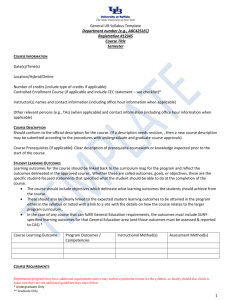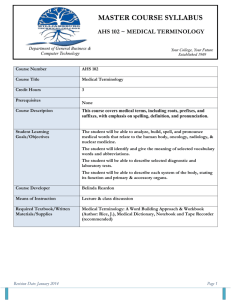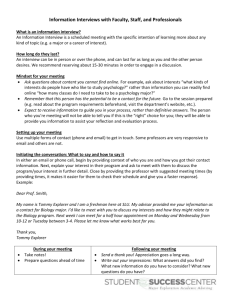SNL course syllabus template
advertisement
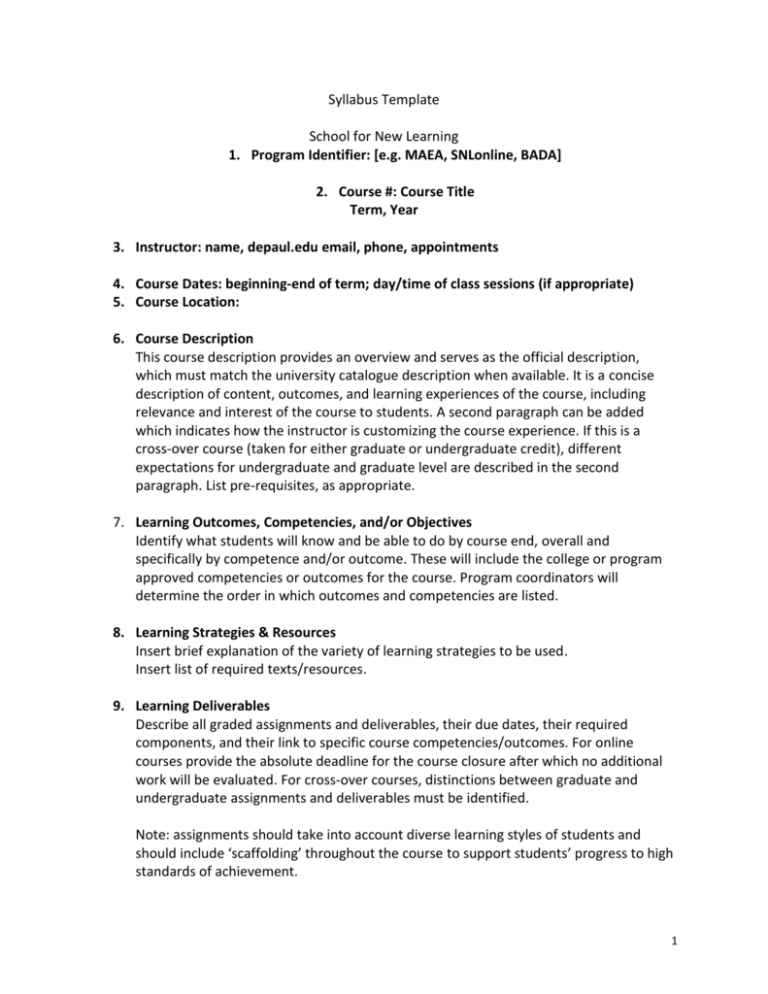
Syllabus Template School for New Learning 1. Program Identifier: [e.g. MAEA, SNLonline, BADA] 2. Course #: Course Title Term, Year 3. Instructor: name, depaul.edu email, phone, appointments 4. Course Dates: beginning-end of term; day/time of class sessions (if appropriate) 5. Course Location: 6. Course Description This course description provides an overview and serves as the official description, which must match the university catalogue description when available. It is a concise description of content, outcomes, and learning experiences of the course, including relevance and interest of the course to students. A second paragraph can be added which indicates how the instructor is customizing the course experience. If this is a cross-over course (taken for either graduate or undergraduate credit), different expectations for undergraduate and graduate level are described in the second paragraph. List pre-requisites, as appropriate. 7. Learning Outcomes, Competencies, and/or Objectives Identify what students will know and be able to do by course end, overall and specifically by competence and/or outcome. These will include the college or program approved competencies or outcomes for the course. Program coordinators will determine the order in which outcomes and competencies are listed. 8. Learning Strategies & Resources Insert brief explanation of the variety of learning strategies to be used. Insert list of required texts/resources. 9. Learning Deliverables Describe all graded assignments and deliverables, their due dates, their required components, and their link to specific course competencies/outcomes. For online courses provide the absolute deadline for the course closure after which no additional work will be evaluated. For cross-over courses, distinctions between graduate and undergraduate assignments and deliverables must be identified. Note: assignments should take into account diverse learning styles of students and should include ‘scaffolding’ throughout the course to support students’ progress to high standards of achievement. 1 10. Assessment of Student Learning Identify the criteria that will be used to assess student learning, each graded assignment, and required deliverables. Make evident how these criteria are directly related to course outcomes, competence criteria, and/or objectives. They should be specific enough for students to evaluate their own work. When criteria are weighted within an assessment, their respective weights should be identified. Indicate if late work will be accepted and if so, the specific amount of deducted points and the absolute date after which work will not be accepted. 11. Grading Criteria & Scale Identify the weight that each course requirement carries in the total course grade, including all graded assignments, deliverables, and if required, attendance and participation. Identify the percentage range of overall scores by letter designation, with minus and plus ranges included. Indicate if fractional points/percentages will be rounded to the higher grade. If a cross-over course, distinctions between graduate and undergraduate level grading criteria and scale must be identified. See additional information pertaining to the grade designations, for graduate grades and for undergraduate grades Identify when relevant Pass/Fail Grading Options (UGRAD only) 12. Course Schedule Insert schedule/outline for each course session (objectives/competencies, topics, learning strategies, assignments, readings/resources, due dates, etc.). If this schedule/outline is subject to change during the course, state so here in the syllabus and include a description of the process whereby changes will be made and communicated. For online, describe the typical/general module pace (e.g., discussions due T, S; written assignments due M; new modules initiate on M etc.) 13. Course Policies Describe here the specific policies and procedures the instructor has for the course that are additional to the college/university policies, for example, classroom/discussion etiquette, late work, code of responsibility, etc. Include how changes to the syllabus will be communicated. (Changes to the originally published course syllabus used to select/register for a course should be communicated in the first session/week of the course in writing; if significant assignment changes are made during the course it should be done officially with the consensus approval of students.) Include the statement: This course includes and adheres to the college and university policies described in the links below: Academic Integrity Policy (UGRAD) Academic Integrity Policy (GRAD) Incomplete Policy Course Withdrawal Timelines and Grade/Fee Consequences 2 Accommodations Based on the Impact of a Disability Protection of Human Research Participants APA citation format (GRAD) 14. Course Resources University Center for Writing-based Learning SNL Writing Guide Dean of Students Office 15. Instructor Brief Bio Insert brief overview regarding instructor qualifications and experience as it relates to the topics, outcomes, and/or competencies of this course. 3


